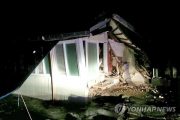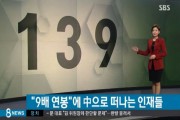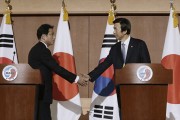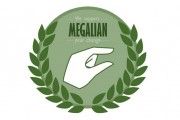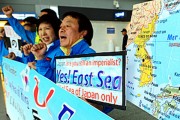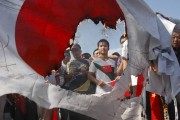Article from Newsis:
Japanese Ambassador to U.S. Alarmingly Threatens Virginia Governor with Pullout of Japanese Firms if State Passes ‘East Sea’ Bill
Japanese Ambassador to the United States is revealed to have sent a ‘threatening’ letter to Virginia Governor when the state parliament was seeking to pass a bill mandating that a body of water between South Korea and Japan be named “East Sea” as well as Sea of Japan in Virginia school textbooks.

The body of water between the Korean Peninsula and Japan is marked as the East Sea along with Sea of Japan.
[Note: South Korea has long claimed that the body of water between South Korea and Japan should be called the East Sea. Japan has pushed for the name “Sea of Japan” to be adopted as the official name for the sea on international maps since the early 20th century. The name “Sea of Japan” is, however, not accepted in Korea and remains a contentious symbol of Japan’s 1910-45 dominance of the Korean Peninsula.]
According to a January 30th report in the Joongang Ilbo, Ambassador Kenichiro Sasae sent a letter on December 26th, 2013 to the Governor of Virginia. The letter underscored the illegitimacy of the bill, and hinted at a possible withdrawal of Japapanese companies which have invested in Virginia should the bill pass.
Earlier on January 28th, the President of Voice of Korean Americans (VOKA), Peter Kim, revealed in an urgent message that the Governor’s staff contacted all of the nine members of the relevant subcommittee within the Virginia parliament and pushed them to repeal the bill.
Governor McAuliffe distributed a letter approving simultaneous use of East Sea in his appeal to the Korean community during his election campaign last year. This targeted campaign is suspected to have prompted anti-East Sea lobbying from the other side.
The disclosure of the controversial letter appears to have exerted a sizable pressure, apparently reversing McAuliffe’s position.
In his letter to Gov. McAuliffe, Amb. Kenichiro, without making the usual pleasantries, bluntly said, “Juxtaposing the names of Sea of Japan and East Sea will lead to three problems.”
Mr. Kenichiro asserted, “First of All, Sea of Japan is the official name for the body of water between Japan and the Korean Peninsula, and it is wrong to say Sea of Japan derives from Japan’s colonial rule of the peninsula. Sea of Japan appears on maps from the 19th century when Japan was enforcing a policy of isolation.
The Ambassador added, “The government of the United States of America acknowledged Sea of Japan as only legitimate name and the Department of State has long maintained the principle of keeping one single name for one geographic feature.
“Second, passage of the bill would mean the Virginia parliament would be politicizing the student body. Students should only learn truths, and politicians should not disrupt their learning,” He added, sounding a note of admonishment.
“Third, my worry is that the bill’s passage would strain Japan-Virginia ties. Japanese enterprises have invested close to $1 billion in Virginia over the past five years, marking the second largest foreign direct investment in the commonwealth. Approximately 250 Japanese corporations are investing in Virginia, with 13,000 jobs created in 2012 alone.” […] “The bill’s passage will risk undermining Japan-Virginia cooperation and the economic relationship.”
The words of “worry,” “fear” in the letter are construed as delivering an oblique but strong warning to the governor.
Diplomacy experts say that the letter, though not explicit, is tantamount to blackmail threatening reduced investment or withdrawal of Japanese firms in the case of the bill’s passage.
Equally controversial is that most of the facts mentioned in the letter are misguiding.
Historically, ancient maps marking East Sea far outnumbers those indicating Sea of Japan, and the letter deliberately hides the fact that Sea of Japan was proclaimed in the aftermath of Japan’s dominance of the Korean Peninsula.
It is also true that the Department of State marks the sea between two allies as East Sea as well as Sea of Japan on its official documents.
As for the presentation of the bill to the Virginia parliament, the bill is aimed at notifying students of the fact that the sea in question is called different names in South Korea and Japan–a goal that is consistent with educational aims of teaching the truth.
Amb. Kenichiro’s delivery of the letter is seen as the final piece of Japan’s behind the scenes efforts to scuttle the ‘East Sea’ bill. Currently, Japan is mounting a lobbying campaign to vote down the “East Sea’ bill pending at the lower house of the Virginia parliament, after having employed a large law firm in the United States.
Even if the bill gets approved at the lower chamber,ratification requires the bill to be signed by the governor after combining with another bill backed in the state legislature. The governor’s veto of the bill would put an end to hopes for its passage. Japan has thus erected multiple lines of defense to ensure the bill’s defeat.
Criticism of South Korea’s alleged diplomatic complacency.
Leaving the VOKA, a nongovernmental association of Koreansin Virginia, to support the bill, the South Korean government has been pursuing “invisible diplomacy.” A Korean-American in Virginia said pointedly, “While the Japanese government is staging a massive lobbying effort, what is the good of “invisible diplomacy”? At this point, invisible diplomacy is nothing but “do-nothing diplomacy.”
Comments from Daum:
광복:
While Japan is lobbying to thwart the East Sea bill, the South Korean government is busy making a history textbook published by the publishing house Kyohaksa, stating that the islets of Dokdo have contested ownership contested.
하얀전사:
Does our government have no will to wage a diplomatic battle against Japan?
kjh: [responding to above]
We might as well get rid of the South Korean Embassy in the United States. I don’t know what the embassy is doing. At a time when Japan fabricates history, the South Korean government fails to safeguard its history. What a sloppy government!
고객님:
The late former President Park Chung-hee rolled up his sleeves to protect national security. Why is his daughter and our president remaining silent about this latest issue?
스파이더 고양이: [responding to above]
What? It was Takaki Masao [the Japanese name for Park Chung-hee] who sold the islets of Dokdo. What are you talking about?
하늘참맑아:
Descendants of pro-Japanese collaborators still thrive in South Korea, and that explains why we remain inactive.
Comments from Daum:
paula cho:
Kyohaksa, a textbook publisher, proudly [sarcasm] describes the islets of Dokdo as being in dispute in its latest history textbook. I think Abe must study history with Kyohaksa’s textbook. The new textbook, if exported to Japan, will be a mega hit there.
김동정: [responding to above]
It’s only natural that we cannot effectively counter external claims when we are divided among ourselves. I’m very frustrated at the current conservative government that condones pro-Japanese acts during the colonial period. Why does Park Geun-hye remain silent about the Kyohaksa textbook issue?
일제개후손들: [responding to paula cho]
Let’s export the Kyohaksa textbook to Japan. It will hit the “jackpot”. That’s how we achieve the creative economy. [Note: Creative Economoy is President Park Geun-hye’s slogan for her plan to revitalize the Korean economy.]
닭보지 빠는 보수일베충: [responding to paula cho]
Aren’t the government and the ruling Saenuri party insane when they advocate the pro-Japanese Kyohaksa textbook while being bristled at Abe’s remarks distorting history? Do they have two different heads? The pot calls the kettle black. The New York Times even criticized Abe and Park Geun-hye both for their behavior.
입만열면거짓말:
The Park Geun-hye administration has gone the extra mile to get the Kyohaksa textbook adopted. I think the government is two-faced.
프리즘:
The government has no excuses. Approving the Kyohaksa textbook gives Japan a pretext for Abe’s provocations.
깡백코:
I am ready to assassinate Abe if the government gives support to me. Please support me so that I can launch a terrorist attack on the Yasukuni Shrine.
redkoree:
When students in South Korea are taught to learn that the islets of Dokdo are in dispute from a textbook, can we ever win over Japan? What can we say when Japan shoves the Kyohaksa textbook at us?
